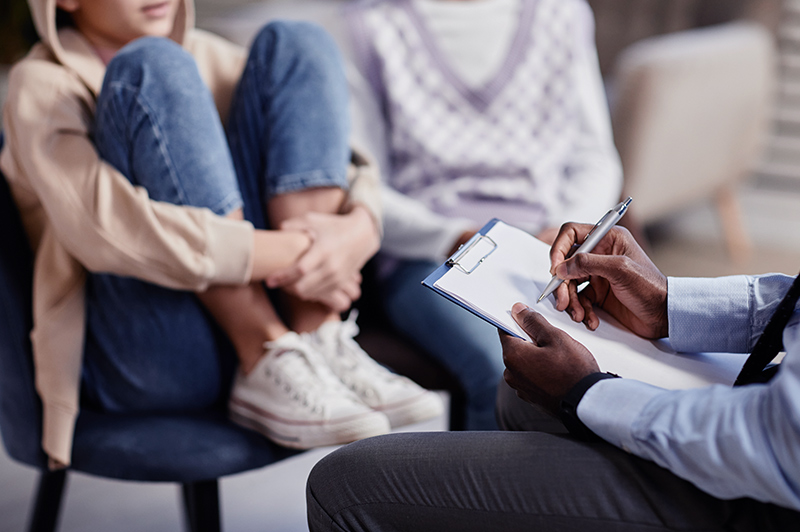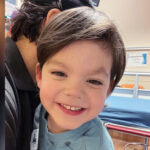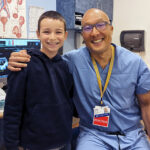Helping manage ‘sensitive issues’: How our psychosocial team helps kids with urologic concerns

In Boston Children’s Department of Urology, urologists, pediatricians, and nurses aren’t the only ones who care for kids and their families. Psychologists, social workers, and child life specialists all work together to help children manage urologic conditions. We sat down with members of the department’s psychosocial team to learn more.
Why did you choose to work in the Department of Urology?

Lillian Hayes, clinical psychologist: My training and background involve working with children and adolescents with medical conditions in hospital settings, so I love that this position allows me to work with kids with a variety of different needs. For example, I provide more traditional psychological and behavioral intervention for kids with incontinence, and I also help educate and prepare children and their families for medical testing, surgeries, and hospitalizations.

Amanda Meers, licensed clinical social worker: I love that I’m able to tap into all my skills as a social worker here: I get to help our patients cope with chronic illness and prepare for surgeries. I get to help families overcome systemic barriers that may hinder their access to care. And I get to teach, research, and develop programs to further support positive patient care. I also have a special interest in supporting children and families who are dealing with the sensitive issues that come up when managing a urological condition.

Christina Vallery, licensed clinical social worker:The Department of Urology provides me with an intersection of my professional interests and academic background in health sciences and social work. I completed my social work internship at Boston Children’s with the Complex Care Service, where I learned the value of an interdisciplinary team to meet the complex needs of children and families. I really like that urology allows me to provide appropriate social work interventions in collaboration with the medical team to care for the children of various urologic needs.

Kelsey Tulley, certified child life specialist: My journey began while I was completing my child life internship. I loved providing procedural support to patients and families and promoting positive hospitalization experiences. There was an opening in the Urodynamics Program, which previously didn’t have a child life position. I instantly felt drawn to fulfill that psychosocial need and role for patients and families.
What do you love most about your job?
Vallery: The best part of my job is witnessing the growth and resilience of patients and families. It’s very rewarding to witness a patient using coping strategies and feeling empowered. It will always be a privilege to partner with families to overcome various systemic barriers to assessing health care, housing, and basic resource needs. I also love our team dynamic! The communication among our team members creates an unmatched synergy that is reflected in our patient care and health outcomes.
Hayes: There are so many things I love about my job! One is the joy I feel when I can really help a child — for example, when a child who has struggled with incontinence starts to see some resolution, or when a child is able to get through a tough medical experience because of the work we have done together. I feel grateful every day to be working with such a wonderful group of people. It’s incredible how we can positively impact the lives of our patients when we put our minds together and collaborate as a team.
What’s a “typical” day like for you?
Tulley: The beauty of my role is that there is no typical day. I work directly with patients and families before and during their urodynamics testing. I provide procedural support to patients of all ages and at all stages in their journeys. I create individualized care plans. I collaborate with our psychosocial team and my child life colleagues on a variety of projects that promote continuous improvement in the care we provide.
Meers: Yes — every day is different! I meet with families in the urology clinic or the Urodynamics Program who have medical coping, resource, or safety-related needs. I also spend much of my time connecting with families by phone between visits and do a lot of care coordination with a family’s community and medical care teams. And I collaborate with the rest of our psychosocial team to create programs, resources, and research that further improve patient experience and access to care.
Why is your role so important in urology care?
Vallery: We recognize how social, cultural, spiritual, environmental, and behavioral factors impact a patient’s care. As a team, we are the linchpin to families around coping, emotional support, psychoeducation, procedural support, and access to resources. Many families who receive care can benefit from support in at least one of these areas.
Hayes: Managing a medical condition can be really challenging for patients and families. When you add anxiety, depression, challenges with attention or learning, and other stressors, it can make it harder to do what you need to do to keep your body and mind healthy. Psychology, social work, and child life are so important to help families make sure all their needs are being met.
What do you want families to know most about your role in their child’s care?
Meers: I want parents to know that social work is available to any patient in our department, and that we are available in between visits too! I think there is often a misunderstanding of the role that social workers play in the medical setting and sometimes families feel nervous when they hear that a social worker is part of the team. It’s my hope that more families understand the support we provide and that more families connect with us.
Hayes: Families sometimes tell us that they didn’t mention behavioral health concerns during their urology visit because they didn’t think it was relevant. We want to treat your child holistically. Your urologists can connect you to our team or other resources you need and may even help us know how to individualize your child’s care. That way, we can help your child be more successful in their urology journey, no matter how long or short.
Learn more about the Department of Urology.
Related Posts :
-

‘The teamwork is outstanding’: A look inside the Colorectal and Pelvic Malformation Center
In honor of Women’s History Month, we sat down with some of the clinicians in Boston Children’s Colorectal ...
-

‘Part of the process’: How a second opinion helped Wynn take control of bladder function
Wynton “Wynn” Smith-Webb is “the most inquisitive kid you’ll ever meet,” laughs his mother, Amber. At just 3 years old, ...
-

One day closer: Second opinion for urologic pain changes Iker’s life at last
Like many kids, Iker Guzman enjoys playing with LEGO toys. But there was nothing lighthearted about the day a few ...
-

Making a change: After a second opinion for spina bifida care, Sydney is thriving
At almost 10 years old, Sydney MacKay is sassy, spunky, and wants to be as independent as possible. Because she was ...





